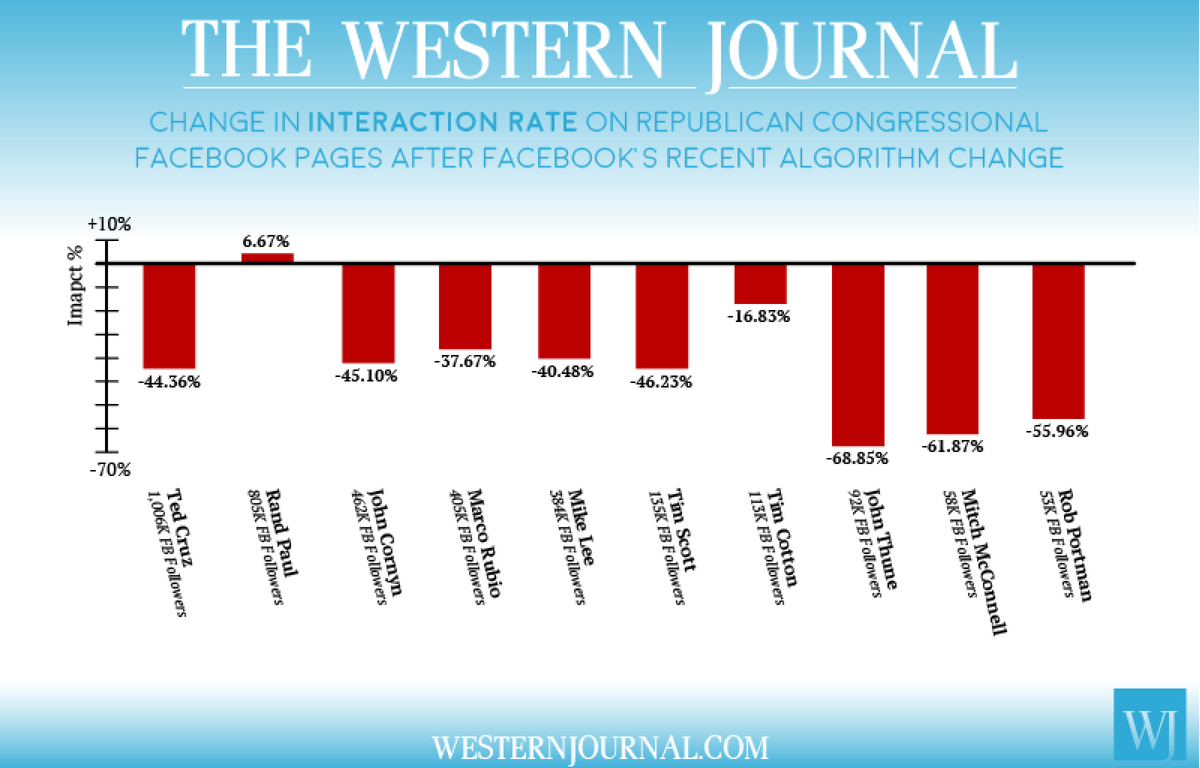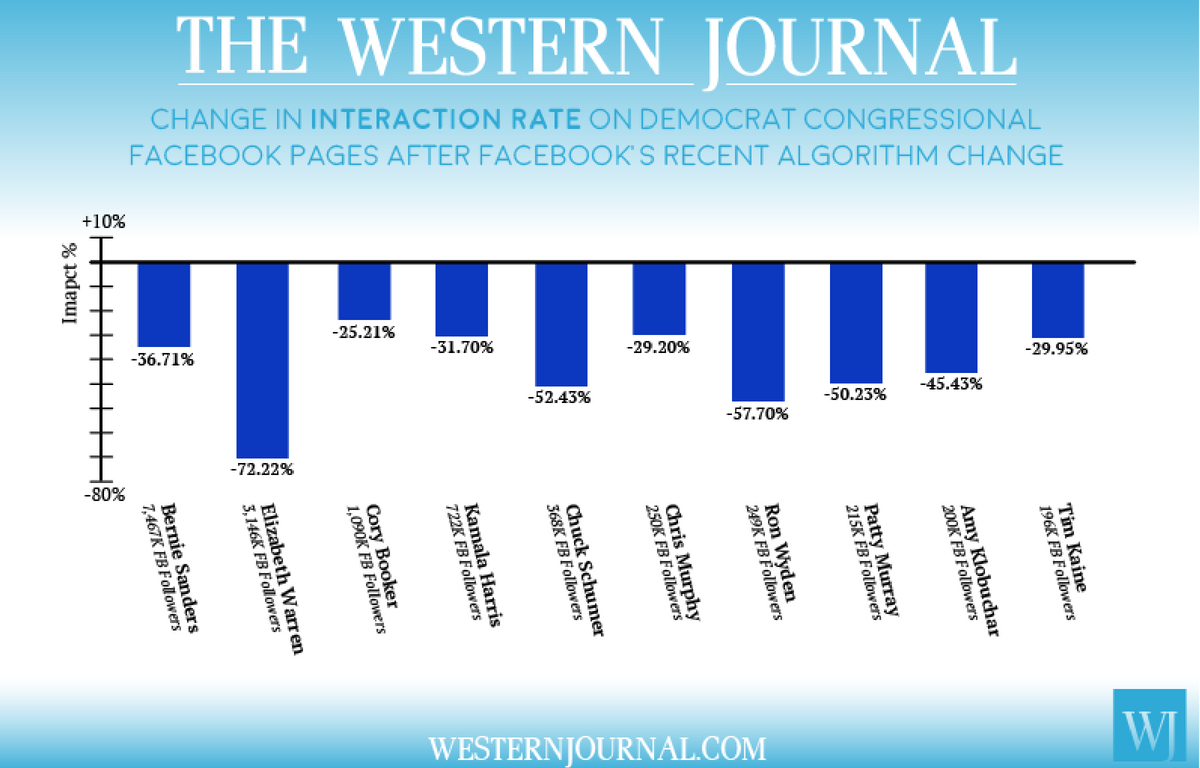Senators with Largest Facebook Pages Hit Hard After Facebook Algorithm Change
The Western Journal previously reported that since Facebook’s latest algorithm change, Congress members’ ability to communicate with their constituents through Facebook has been dramatically lessened, and conservative-leaning publishers have been negatively impacted.
A new analysis of the top 10 largest senator Facebook pages — based on the pages “likes” for senators from both major parties — shows that both Democrat and Republican senators saw a significant decrease in interaction rates with their followers.
Interaction rates are the average interactions (likes, shares or comments on a post) divided by the number of page followers for each page. Regardless of a change in the number of posts or followers, the interaction rate on a given Facebook page should remain similar from month to month, all else being equal.
Facebook CEO Mark Zuckerberg announced in January that the social media platform would prioritize “friends, family and groups” in users’ News Feeds and show fewer public content like posts from “businesses, brands, and media.” The dramatic decrease in interaction rates on these senators’ pages indicates that some pages have indeed been targeted, intentionally or unintentionally, since this change was made.
This change has serious implications, as it diminishes public discourse and quiets certain voices on one of the largest social media platforms in the world.
As The Western Journal reported in July, pages associated with members of Congress from both major parties saw a significant decrease in interactions with readers, but the Facebook pages of Republican members of the House and Senate were impacted measurably more than those of their Democrat counterparts.
This means Americans who stay informed with actions from Congress by following the Facebook pages of their state’s senators and representatives are less likely to see posts from these government-linked pages.
Further, if senators’ ability to deliver their message to the states they represent is hindered, the public is less likely to know what the senator stands for, which could eventually lead to an uninformed public and swing elections in the United States.
The Western Journal downloaded months of pre- and post-algorithm change data through CrowdTangle, a social monitoring platform owned by Facebook, for congressional Facebook pages from August 2017 through June 2018. The chart below compares data from the five months prior to January to the five months after January. (Data from January 2018 was omitted because the algorithm change was made partway through the month.)
The top 10 Republican senator Facebook pages saw a 41.07 percent decrease on their pages, while the top 10 Democrat senator Facebook pages saw a 43.08 percent decrease on their pages.
Top 10 Republican Senator Facebook Pages

Republican Sen. Rand Paul was the only senator who’s interaction rate increased after the algorithm changes that began in January. The interaction rate on his page increased by 6.67 percent.
The interaction rate on the Facebook page of Sen. Ted Cruz, R-Texas, decreased by 44.36 percent, even though he posted more on his page after January 2018. Cruz is one of the senators who questioned Zuckerberg about the issue of political bias against conservatives and Christians on Facebook during the CEO’s appearance before the Senate in April.
Florida Republican Sen. Marco Rubio also posted more on his Facebook page after the algorithm change, but the interaction rate on his page decreased by 37.6 percent.
Rubio told NBC’s Chuck Todd in March that he is “disturbed” by the lack of transparency from Zuckerberg’s company. “Every time that we’ve spoken to them, it’s kind of rolled out as more coming out,” he said, according to Business Insider.
Among the other Republican senator Facebook pages, Texas Sen. John Cornyn saw a 45.10 percent decrease in interaction rate on his posts. The interaction rate on Facebook posts by Sen. Mike Lee, R-Utah, decreased by 46.23 percent.
The interaction rate on South Carolina Republican Sen. Tim Scott’s Facebook page decreased by 46.23 percent. Scott is another senator who has voiced his concerns about Facebook.
“Facebook’s support of freedom of speech seems to only include liberal speech. Facebook has decided that they are within their rights to censor speech, certain speech,” Scott said during a HELP Committee meeting earlier this year.
The interaction rate on the Facebook page of Sen. Tom Cotton, R-Ark., decreased by 16.83 percent. The interaction rate on South Dakota Sen. John Thune’s Facebook page decreased by 68.85 percent. The interaction rate on seen by Senate Majority Leader Mitch McConnell, R-Ky., decreased by 61.87 percent.
The interaction rate on Ohio Sen. Rob Portman’s Facebook page decreased by 55.96 percent, but he also had an extraordinarily high interaction rate on his posts in December.
Top 10 Democrat Senator Facebook Pages

Vermont Sen. Bernie Sanders — who caucuses with the Democrats — accounts for 60 percent of the total interactions on Democrat Facebook pages. His official Facebook page has 7.4 million followers as of August 15. The interaction rate on Sanders’ page decreased by 36.71 percent.
The interaction rate on Massachusetts Democrat Sen. Elizabeth Warren’s Facebook page decreased by 72.22 percent. The interaction rate on the page of Sen. Cory Booker, R-N.J., decreased by 25.21 percent.
The interaction rate on California Democrat Sen. Kamala’s Facebook page decreased by 31.70 percent. Harris has also expressed her concerns about Facebook’s transparency.
“Mark Zuckerberg’s failure to answer several critical questions in his appearance before the Senate today leaves me concerned about how much Facebook values trust and transparency,” she posted on her Facebook page after Zuckerberg’s testimony in April.
The interaction rate seen by Sen. Chuck Schumer, D-N.Y., decreased by 52.43 percent. The interaction rate on Connecticut Democrat Sen. Chris Murphy’s Facebook page dropped by 29.20 percent.
After Facebook banned controversial radio host Alex Jones and his Infowars website, Murphy said, “(Facebook, Apple and YouTube) are private companies that shouldn’t knowingly spread lies and hate. They took a good first step today by removing Infowars,” according to The Hill.
The interaction rate on Oregon Democrat Sen. Ron Wyden’s Facebook page decreased by 57.70 percent. “There are going to be people who are going to say Facebook ought to be broken up,” Wyden said before Zuckerberg’s appearance before Congress, Tech Crunch reported. “There have been a number of proposals and ideas for doing it and I think unless (Zuckerberg) finds a way to honor the promise he made several years ago, he’s gonna have a law on his hands.”
The interaction rate on the page of Sen. Patty Murray, R-Wash, decreased by 50.23 percent. The interaction rate on Minnesota Democrat Sen. Amy Klobuchar’s Facebook page decreased by 45.43 percent.
Klobuchar was one of the senators who pushed for Zuckerberg to testify before the Senate Judiciary Committee. “They keep saying, ‘Trust us, we can take care of our own people and our own website,” she said in March, the StarTribune reported. “Well, that’s not true … That’s the attitude that got them in trouble.”
The interaction rate on Virginia Democrat Sen. Tim Kaine’s Facebook page decreased by 29.95 percent. California Sen. Dianne Feinstein’s government-linked Facebook page was the 11th largest Democrat senator Facebook page. The interaction rate on her page decreased by 5.88 percent.
The Western Journal reached out to the offices of a number of these senators but did not receive comments in time for publication.
To conduct this evaluation, The Western Journal pulled Facebook data from CrowdTangle for all current Congress members with a Facebook page. That data was aggregated for Facebook pages from August 2017 through June 2018.
However, because Facebook reveals a limited amount of data regarding public pages — and essentially no data at all about the algorithm used to show posts on users’ News Feeds — the ability of users, journalists and others to analyze cause and effect is extremely limited.
What is clear is that the ability of your elected officials in the Senate to communicate with you through Facebook has been directly and unilaterally reduced by the January algorithm change, and that Facebook’s significant lack of data transparency makes it impossible for The Western Journal, government regulators or anyone else to defend Facebook’s internal processes as unbiased or make a credible accusation of intentional bias.
For details about this data set, and to view the full data available, please visit this page.
For the rest of our Congressional Facebook Analyses, follow this link.
Truth and Accuracy
We are committed to truth and accuracy in all of our journalism. Read our editorial standards.
Advertise with The Western Journal and reach millions of highly engaged readers, while supporting our work. Advertise Today.












